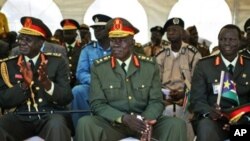After a 2005 peace deal that ended 21 years of civil war in Sudan, both sides agreed to reduce their armies by 90,000 soldiers. In the south, the process has been seriously delayed because of waste, disagreements among organizations and poor planning. The capital of the semi-autonomous south, on the problems with disarming soldiers and the program's future.
In a little more than a year, $105 million has been spent on the disarmament of Sudanese soldiers and their reintegration into society. The $25 million or so of that money that has been spent in the south hasn't paid for much, at least as far as the south's former soldiers are concerned.
90,000 troops are supposed to be moved from the southern army into civilian life by 2012. Since a disarmament plan was agreed to in 2007, only about 9,000 southern soldiers have started the program. This is far behind progress in the north. There is widespread agreement among the organizations running the program, known as DDR, that there are serious problems with the way it is run.
A conference on DDR was held in the southern capital Juba on November 15th and 16th to look at ways to fix the program in the south. Independent consultants said in a draft report on DDR that, "The review team foresees the need for a complete reformulation of the DDR in Southern Sudan."
The reasons cited included the complaint from the army and the government of the south they have never been in control of disarmament. The chairman of the south's disarmament commission, William Deng, said the original agreement was that the government owns DDR. The United Nations Development Program controls the funds for the last and most difficult step: reintegration.
"But we are not in charge of it," Deng said. "That is the meaning of ownership. What we are approving, we are approving the paper, but the programatic plan is done by the UNDP and it is given to us as a fait accompli. So in a fait accompli, either you refuse it or you do it."
Deng said the very young southern government knew it could not handle the money for the program. The total nationwide budget is $430 million. So the UNDP was given the task of controlling the money. Joe Feeney is the head of UNDP in Juba. In his view, the UNDP is working with the government, not telling it what to do.
"We want the government in south Sudan to be leading in this," Feeney said. "I am head of UNDP in South Sudan and, from my perspective, my job is to build a strong government."
There is a national DDR commission, based in Khartoum, and the United Nations Mission in Sudan helps with the disarmament phase. After disarmament, ex-combatants are offered options on which type of work they want to do.
If they choose farming, they are trained by development organizations like GTZ, IOM and FAO. Finally, they are given what's known as a start-up kit, in this case tools and some seeds. As of October 22nd, only 683 people in the south had received the start-up kits.
Jean-Christophe Goussaud runs the GTZ training center in Juba. Ex-combatants are given literacy and vocational training. Goussaud says it has been a challenge to get the program moving with so many organizations involved.
"That involves a lot of NGO, BRAC, other UN family members, FAO, IOM, GTZ," Goussaud said.
According to Feeney of the UNDP, the challenges of working in the south have also slowed progress. After more than two decades of civil war, the soldiers leaving the army are largely illiterate, completely unaccustomed to civilian life and expect large dividends after so many years of fighting.
Deng says he has been calling for changes since early 2009, some of those changes were included in the draft review of the program completed just last month. One is to focus more on development in the ex-soldiers' communities. Another is to make clear who is in charge of each part of the program.
According to Feeney of the UNDP, changes and progress on disarmament has been slow because of the procedures involved when spending public money.
"UNDP is using taxpayer money from all over the world and there are many things that I would like to do to get moving very fast," Feeney said. "But I cannot do it. We work with an internal control framework where we justify how we use public money. We have public money, we are responsible for that public money."
But it is not clear that all the money has been used appropriately by UNDP. An October audit of the nationwide DDR program by internal investigators found a variety of problems, including quarterly reports routinely submitted late, if at all, to donors. In less than two years, $6 million, or 30 percent of the money spent, was on salaries for high-level, international professionals while the number of mid-level positions was reduced by almost 100.
The DDR program in Sudan, particularly in the south, is currently undergoing a major review. After the January referendum, there might be a new person in charge or another organization controlling the funds. Maybe ex-soldiers will go through training while still collecting an army salary. One thing is for sure, almost five years after the end of fighting, nobody in the south is happy with the way it is working.
North, South Sudan to Reduce Army Size











